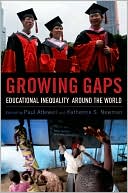Rachel Dearlove reviews a volume that provides insight into how difficult the coalition may find keeping its promise of equality when it comes to radical change in the higher education system.
Growing Gaps: Educational Inequality Around The World. Edited by Paul Attewell and Katherine S. Newman. Oxford University Press. December 2010.
Find this book at: ![]() Google Books
Google Books ![]() Amazon
Amazon ![]() LSE Library
LSE Library
 Paul Attewell, a professor of sociology and urban education at City University of New York, drew attention in the USA in 2009 for his Passing the Torch: Does Higher Education for the Disadvantaged Pay Off Across the Generations? (co-authored with David E. Lavin). In this volume he has come together with the distinguished and widely published Katherine S. Newman, sociologist of poverty and the working poor, to bring together a collection of 12 case studies. The collection has grown out of Princeton University’s ‘Global Network on Inequality’ – an annual conference of 25 international research institutions engaged in research on the causes, consequences and remedies for inequality. The authors examine the paradox that is the persistence of social inequality despite, in the case of the countries considered, almost universalised access to primary, secondary and in the case of South Korea, tertiary education.
Paul Attewell, a professor of sociology and urban education at City University of New York, drew attention in the USA in 2009 for his Passing the Torch: Does Higher Education for the Disadvantaged Pay Off Across the Generations? (co-authored with David E. Lavin). In this volume he has come together with the distinguished and widely published Katherine S. Newman, sociologist of poverty and the working poor, to bring together a collection of 12 case studies. The collection has grown out of Princeton University’s ‘Global Network on Inequality’ – an annual conference of 25 international research institutions engaged in research on the causes, consequences and remedies for inequality. The authors examine the paradox that is the persistence of social inequality despite, in the case of the countries considered, almost universalised access to primary, secondary and in the case of South Korea, tertiary education.
Attewell’s introductory chapter provides a neat synopsis of major theories of the relationship between education and occupational and material success, including regime theory which forms the theoretical lens for many of the subsequent chapters. Attewell also skilfully summarises the problems which societies face when an expansion which has sought to broaden access has in fact reproduced social inequality. Rather than being a global panacea, this volume demonstrates how educational expansion can and already has resulted in simply a different system through which inequalities are reproduced.
The chapters draw their analyses, with one exception, from large scale existing quantitative data sets. The rather data heavy presentations lost the attention and understanding of this lay reader at times, leaving a feeling of occasionally missing the message – particularly with regard to Malcolm Keswell’s chapter on education and racial inequality in South Africa. Despite this, the case studies, still provide useful evidence. Given the radical changes in progress with regard to higher education in the UK, and the coalition government’s promises that in the new system equality is still a policy priority, this volume provides insight into how difficult it might be to keep that promise.
Kwang-Yeong Shin and Byoung-Hoon Lee’s insight into the truly mass higher education participation system in South Korea – where the tertiary enrolment rate stands at 85% – is a perfect example of ‘more does not always equal better’ for equality. South Korea massively expanded its higher education provision in the 1980s and 1990s – but only 25 out of 175 universities are public and competition to get into the best is fierce. With social status and financial security tied to educational achievement, the authors suggest that educational competition becomes “a marathon race from pre-school to high school”. Middle class parents are in the best situation to provide the private resources and operate the best strategy which will steer their children into the ‘right’ middle school, high school and university. The authors argue that “remarkable class differentials in educational attainment indicate that unequal opportunity is an institutional principle of the South Korean education system” despite such wide participation.
Louis Chauvel and Pawevl Polawski look at the phenomenon of over-education in two radically different societies – France and Poland, respectively. Chauvel argues for the disputed long term ‘scarring’ effects of intergenerational inequality on the post-baby boomers of France – who have had their social mobility and quality of life sacrificed to maintain the standard of living of the generation before, leaving them overeducated and underemployed. Polawski explores the mismatch between education and labour market needs in Poland leaving the current generation feeling that they have been mis-sold a form of working life and a ‘graduate premium’ which has not materialised.
So will the middle classes in the UK continue to be the best at ‘playing the game’ in the new educational reality? Will some end up ‘middle class losers’ like Yi-Lee Wong’s subjects in Hong Kong? Will the current generation be left ‘scarred’ by being excluded from university and/or excluded from the workplace in such a competitive employment market? Will an increased personal financial investment in higher education under the new fee regime end with anger and disappointment if a better working life does not materialise at the end? Prediction is difficult, but this volume shows that a great deal of evidence is already out there.
Rachel Dearlove is a university manager with a special interest in international education.
Find this book at: ![]() Google Books
Google Books ![]() Amazon
Amazon ![]() LSE Library
LSE Library




